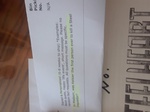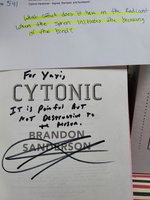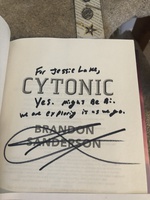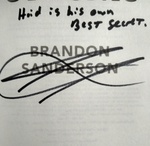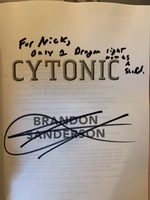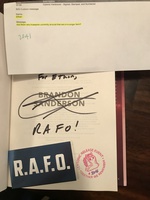Brandon Sanderson
Long time ago now, years and years ago, I, with my family, went to Fiji. And I always like to just write something inspired by a place I visit. And on Fiji, we went and visited one of the local villages. And that's how they describe them, with a chief; even though it's very modern, they still maintain that structure and society. And one of the cool things that the guide who toured us around this, his title was the Kingmaker. And he explained to us his job was to be the person who picked the next king. The king, or the chief, does not get to pick his successor; the Kingmaker, who is a different family line, picks the successor to the king. Which I thought was so cool. It's like it's a check and balance upon the monarchy that I had never heard of before; it's a really sophisticated system that I just thought was awesome. And so I said, "I'm gonna write a book using that idea at some point." And I only managed to get a few chapters of the way into it. I did set it on First of the Sun, the planet where Sixth of the Dusk takes place.
So I am going to read to you from the prologue and a bit of the first chapter (I didn't get much beyond this) of a book I called Kingmaker.
Brandon Sanderson
Prologue
It begins when the dying man takes his last breath. Death is not uncommon; indeed, it's one of the few universal experiences humans share. It's a pity that we often come to it underprepared, considering it's the singular thing for which, by definition, we have the most time to prepare.
In this story, fortunately, the man was well-prepared. He'd asked all the questions he could think to ask, and gotten all the answers he'd thought he could get out of life. That was preparation for him, being ready to get answers to the questions he couldn't answer. He'd known for years that he would die; and not as everyone knows death is eventually coming. Rather, he knew death was coming for him in a way you might know to expect the 9:14 train. Yes, it could arrive a little later; but you'll be leaving the station before noon, one way or another. Malignant, they called the infestation growing inside of him. Terminal. How odd, to be killed by growth; not decay, not blood loss, not (as he'd assumed would someday be his lot) by being taken during an ocean hunt. But of something growing, living, just doing a little of too much of both. It felt so very modern to be dying of something called colorectal adenocarcinoma. He'd been born in a time when they'd used simpler terms; but modern science had brought more than steam engines and telegraph machines. It had granted many diseases honored promotions, so chiefs no longer had to die in their own filth, but instead could fall prey to gastroenteritus. And he was a chief, our soon-to-be corpse.
Ah, but you must know the scene before we continue. I shall describe it as he would have; for it had been years since he'd seen anything other than a milky white haze. Fortunately, if you were wise, you do not need to be able to see in order to tell people where to go.
He could hear the ocean, first and foremost. Like many of his people, the chief hated places where you couldn't hear the ocean. When he'd been young, he'd worked on the inland <taro> fields by his father's orders. Those were far from the ocean; it took an hour by canoe up the river, away. It had been the worst year of his life, and that counted the ones dying of cancer.
Today, he could smell the sea. Tradition on the island of <Amore> saying that the chiefs never rotted after death. How could they, when they'd been steeped in brine for so long? The chiefs were the mediators between island and sea, and they bled salty blood. The ocean was in their veins, the crusty lava rock in their bones. He thought fondly of laying in the mausoleum near his father, on a slate block of stone quarried from the rim of a dormant volcano. He'd lay there, smiling as corpses do, baked for all eternity by the sallow candles, massaged by the songs played for the dead, just like the chiefs before him.
Chief. Now, that was an interesting term these days. But the Home Isles had always had chiefs; that would never change. Now they also had representatives, elected by direct voice of the people. These traveled to the distant government seat and made policy, while the chiefs remained on their islands. For what was a chief when away from his people, his soil, his seed? Not that the chiefs were impotent; they set island policy and grumbled at the need for interference from the government. The chief represented the tribe, which, in this story, meant all the people living on one small island, some six hundred in total, all related. The representatives led the country, but the chiefs led the families; each one, a tiny king. They were the guardians of tradition and executors of modern policy all at once. As such, the term nestled comfortably between the new and the old, like that spoon that slid off the counter and jammed itself in the spot between wood and wall: stuck, stubborn, and somehow still a perfect fit.
He nestled there now, right between the old and the new. A breeze blew in through the open parlor doors. They built their homes for years in such a way as to invite the breeze in, as an honored guest. But he also felt the blowing fan overhead, rhythmically clicking from its spidery place in the ceiling. A modern convenience the chief's home had, as it needed power to work the telegraph machine. It was the only place in the entire island that was electric, powered by some very large chemical batteries that you'd have called primitive. But here, they were the utmost leading edge of technology, developed proudly by scholars without the help of the Ones Above.
There. Can you feel it? Soft sheets beneath your back, cool breeze on your cheeks, fan counting off the last seconds of your life? Ocean calling to your soul? No pain; but also, few deep thoughts. The drugs prevented both.
Now, add footsteps. They made the rug creak; it was woven of beachfront frond leaves given to him by the chief of <Luma> island, the next one in the chain. The steps didn't click; they sounded from feet unshod, so it wasn't the nurse.
"Coral?" the chief asked. Was it his first son? "Squall?" The second, perhaps. No response. "I need a drink," the chief said, reaching limply toward his nightstand. "It no longer hurts to drink. It no longer hurts at all."
No response. The chief had to wonder if he'd hallucinated the sounds. His brain seemed to be floating in soup these days. He drew in a long, ragged breath.
That's the one. His last. This is where it begins. Because, before the chief could release that breath, a pair of gloved hands locked around his throat and squeezed.
Strangely, it didn't hurt, either. Someone is killing me! The thought reached his brain slowly, as if by a bird messenger, rather than telegraph. Someone is killing me... before I can die. He fought, because he was a chief, and because he didn't like someone taking what the gods had claimed. But he couldn't even relieve himself these days without help, so fighting back an attacker was impossible. Those hands just squeezed tighter. The white that was his world began to grow dark, and he realized, prepared though he thought he was, one more question had shown up last minute. Demanding. Confusing.
Who murders a man that has days, maybe mere hours, left to live?
Chapter One
The steamship cut across the ocean like a hunting knife crossed the skin of a beast: straight, unconcerned, leaving a scar behind in the waves. <Tulaku>, the Kingmaker, loved standing at the ship's rail, feeling the wind beat her face, watching the impotent waves break against the hull. It felt so modern to be able to impose human will upon both wind and wave. It had been an eternity since she'd enjoyed modern conveniences like this. They were so uncommon out here in the Scattered Isles, the backwaters of a land with, admittedly, quite a lot of water. But her time here was done; the ship steamed inward with clocklike precision. The Kingmaker had duties at <Tory>, the grand island where the government and corporations were run. So the steamship would carry her there. It wouldn't wait until the tide turned; it wouldn't wait for favorable winds. It would go now.
She was a young woman, this Kingmaker, and if you'd been from her world, you'd immediately have noticed something off about her. Something unusual, other than the youth. That, at least, was evident only when you looked at her face. Everything about her served as an intentional distraction from her youthful figures. The traditional clothing, shrouding her in a cloak of Aviar feathers. The posture, so carefully cultivated to project strength, confidence, and authority. The ceremonial oar, held like a staff with its arrowhead-shaped paddle toward the sky, crowned with the jagged teeth of a mature ocean shadow beast. Everything about her proclaimed aged wisdom.
But the face. That embarrassingly youthful face. <Tulaku> had learned to deal with the looks. She no longer glanced down in embarrassment when introducing herself, no longer winced visibly when people expressed surprise at her age. Yet there was something about her expression; the way she'd meet her eyes, then draw her lips to a line. The gesture seemed to admit: "We apologize for the inconvenience of sending a teen in the place of your expected wizened elder. Please wait while we remedy the situation. Note: this process may take forty years." She hoped, as she put the Splintered Isles behind her, she'd also escape those experiences. She'd rarely felt them at home; senators and company presidents there could be young and vibrant, so why not Kingmakers? There, you wouldn't be judged by your age, but by your ambition, and perhaps the quality of the names in your personal address book.
As she contemplated this, a large man shuffled down the steps from the bridge, his Aviar flapping wings to balance on his shoulder. The captain didn't wear a uniform; he was a company man, not a soldier. Though the distinction and authority between those two roles was subtle, the distinction in costumes was not. Captain <Hatchi> wore a thick woolen coat, a scarf, and a captain's hat. He rested hands on rail, fingers wrapped in thick workman's gloves. His Aviar, Chipper, had plumage of radiant green and red: one of the species that protected a ship and its crew from the questing minds of beasts that lived beneath the waves. Those had been exterminated from these populated shallows, of course, but it was a lucky Aviar breed nonetheless, one you often found accompanying sailors.
"Do you ever feel like a god out here, Captain," <Tulaku> said, "cutting across the waves, unencumbered by mortal concerns like current or wind?"
"Once in a while," he said, "until a storm comes. Then, well, I remember my mortality right fast, Kingmaker. Right fast." He kissed his fingers and held them to the wind, which was blowing in from the east. The direction to the Pantheon islands and the gods they represented.
"But surely," <Tulaku> said, "we can weather even storms, now? Only modern society has designed machines that can ignore the wind. We go where we want!"
"Yes, yes," he said, "but doesn't that make the machines the gods, Kingmaker? I'm not stronger than my ancestors. They crossed the seas, too, against the waves and in canoes. Doesn't take steam to manage it; just power." He glanced at the puffs coming from the boiler. "One type or another. But now, I shouldn't contradict you, wise one. Forgive me."
The ship continued through the ocean, belching confident black smoke, undaunted by both still wind and storm. Steered by compass, not by the lapping of waves. Indeed, the captain often thought about his father, who'd been a captain during a different time. His father's ship had once run aground on a deserted island, but the crew had patched it up and then been on their way. If the steamship were to break down, <Hatchi> knew he wouldn't be able to repair it. Then again, there were specialists for that sort of thing. And so, the more men progressed collectively, the less it seemed like the individual had anything to know. Ignorance was its own kind of luxury.
The Kingmaker frowned, consumed by her own thoughts, which sailed a different direction from <Hatchi>. As she got to more cosmopolitan areas, she'd gladly put behind the questioning eyes, the doubts that her age caused. Yet she'd also leave behind some of the reverence that people like <Hatchi> showed her. That had been one nice aspect of these rural islands and those who sailed them.
"You should know, Kingmaker," the captain said, "that a telegraph is arriving for you. It should be ready and interpreted shortly. That's why I came looking for you."
A telegraph. Now there was a modern innovation, and one all their own, not a gift from those Ones Above. Messages traveled the islands invisibly though the air, almost like a bird.
The Kingmaker winced, looking down at the ocean. If you'd known the people of this land, you'd likely have been surprised at the sudden pain she felt, thinking of birds. Then you'd look at her shoulder, see what was missing, and realize at last what had seemed off about her all along.
"The telegraph will be my mentor," she said to the captain, "with some words of encouragement." Please let it be that, she thought. And only that.
There had been a time when every island had its own Kingmaker. Someone to watch the chief and act as a balance to his ambition. The Kingmaker couldn't, of course, unseat a chief. The gods had placed the chief where he was, after all, and mortals should not intervene. Yet everyone agreed there should be some check upon the chief's power. Even the chiefs themselves tended to agree, something you might find curious. This is likely because you're familiar with large kings of nations, rather than the small kings of the islands. Large kings tend to be gluttons. Give them a mansion, and they'll want two; pay them some taxes, and they'll wonder how high they can get. Grant them a taste of absolute authority, and they'll chug the whole bottle. But, like a remarkable number of things when it comes to human society, monarchy tends to work far better on the small scale. A mansion doesn't feel so necessary when your brother has a hut. Taxes feel different when squeezed out of the man who taught you to fish. And absolute power doesn't feel so absolute when your mother chides you for abusing it. So generally, yes, the chiefs themselves liked having someone to watch over them. You wouldn't believe it, from the way the two offices tended to squabble.
Ah, but I still haven't explained: what is a Kingmaker? Well, it is as it sounds. The Kingmaker chooses the next ruler. They couldn't unseat the current chief, as I said, but they could do something nearly as bad. They could end his dynasty, choosing someone outside his lineage to take the throne. Every chief had to live with a certain fear of that possibility. Rule poorly, and you'll suffer patrimonial emasculation in the form of a rival son being given charge of your throne, and in many ways your legacy, once you were gone. Most Kingmaker interventions in <Tulaku>'s bold, oh-so-modern times, were just for show. Chiefs had to work alongside elected officials, and dynasties were usually preserved in the name of tradition. Chiefs represented tradition; upheld it. It was actually one of the few remaining powers in this day of senates, corporations, and individual suffrage. Because of this, the Kingmaker's job had changed over the years. They watched the kings, not just as it related to their successions. If the king were to break the law, for example, what did one do? In the past, nothing. These days, the king was not the law; indeed, the law carried a ceremonial oar, and sometimes wore too young a face for her station.
These days, there was often just one Kingmaker serving a dozen or more islands, and she didn't even have to attend or even sanction every coronation. If a ruler was liked, and a clear heir existed, the change of power could be sealed by telegraph. But if a succession was disputed, then one would be assigned to see to the matter personally. If one was already in attendance nearby, it would be her job. And if none were in attendance... well, it would fall upon the nearest passing Kingmaker. A tradition that <Tulaku> was now coming to find extremely inconvenient.
Brandon Sanderson
So you can probably tell from that, I was experimenting with some omniscient voice in that. It got really tell-y; I apologize for that. That was me just being whimsical and figuring out the worldbuilding as I wrote. You do that in first drafts, sometimes. I'm still very fond of that piece; I'm not sure if I will ever use it for anything in the future. There was definitely some awkwardness about the voice, but also it had some nice turns of phrases, which were fun.

